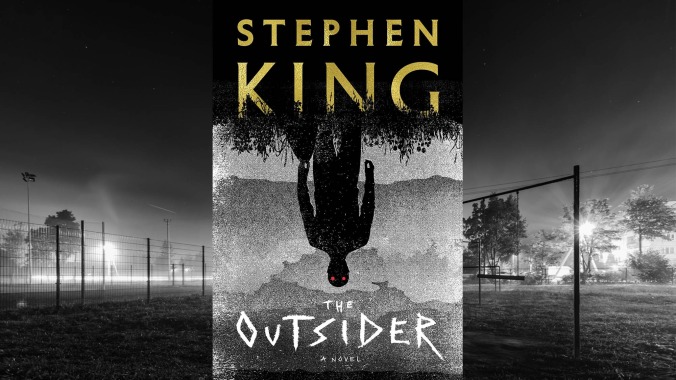Stephen King’s The Outsider is an It for the Trump era

Stephen King’s The Outsider is in many ways a throwback novel, a creature feature that seems ripped from his ’80s heyday, his pulpiest book since perhaps Cell, but a work undeniably founded in today’s fears. Ostensibly centered around a shapeshifting Pennywise-like murderer of children, its darkest threats are less fantastical and defeatable than uncontainable and unnervingly mundane. King’s real subjects here are a world spinning out of control, the dangers of people who refuse to see the truth, and the rotting of a society in moral decay, like a supernatural No Country For Old Men. It seems significant that a character is threatened not with death, but with cancer, this world’s condition made manifest in the flesh. It seems more significant that twice we’re taken to locations where a ghastly event has occurred. One of them is graffitied with a swastika, the other with TRUMP MAKE AMERICA GREAT AGAIN TRUMP. Well, don’t monstrous times deserve a monster of their own?
Shifting the action from King’s beloved Maine to an unholy Bible Belt, The Outsider opens with the discovery of a brutal crime: a child who was slaughtered, raped, and partially eaten. The only silver lining for the Oklahoma cops investigating the case is its apparent open-and-shut quality—there are witnesses, fingerprints, and DNA evidence, all of which directly implicate the small town’s beloved Little League coach. The only complicating factor is his airtight alibi, which can only be explained—or not explained, rather—by his being in two places at once. It’s an example of genuinely alternative facts, in that both stories seem provably right, a contradiction that no one is able to grapple with.
What’s remarkable and deeply pleasurable about the book is the way King slowly builds this world out. He may be tilling genre ground that’s similar to early blockbusters like Pet Sematary and It, but he’s doing so with the patience and maturity that’s marked the elder statesman stage of his career. He doesn’t tell a scary story so much as arrive at one; he takes the time to consider the rippling effects of violence on victims, and it isn’t until the book is significantly over that he even leaves his main characters to shade in what else is going on.
At the same time, here is the creepy King we grew up with, his grindhouse instincts firmly intact. Old-school fans who prefer his down-and-dirty-pillows work to his more literary output will greet this as one of his strongest in years. It certainly is from the point of view of pure plotting; King has become so adept at structure that multiple times you get that all-too-rare story satisfaction, as a key piece of information you absorbed without realizing it suddenly reveals its significance.
All of these strengths are enough to offset some of the book’s weaker qualities. King’s premise is so engaging that there’s a bit of a downshift in enjoyment when the mystery section turns into suspense, and then again when suspense turns to action. The Outsider itself, who also recalls Randall Flagg and the shit-weasels of Dreamcatcher (one sequence here, set during a bout of diarrhea, nearly justifies his impulse to write that misfire), finally emerges as a bit of a letdown, more compelling when talked about than in its onscreen moments. And as much as a pageturner as this is, it isn’t one of King’s scariest.
There’s also King’s, shall we say, generous view toward his characters, his way of making them so distinct that they become distracting. Conversations unnaturally include exchanges that explain jokes or underline references. Some characters use invented slang while others with no other literary inclinations are liable to quote poetry or reveal thematically relevant memories to near-strangers. It’s just not convincing that a modest and quiet woman would use the verb “splooge” here, or that she would refer to life being “poopy” after an attack.
Of course, these things all come with the territory when it comes to King; they’re as much a part of the fun of his prose as they are a part of the problem. And despite some rough edges, he really has given pop culture a near-unending parade of memorable moments and characters. That tradition continues here, notably with a novice private investigator whose encyclopedic movie knowledge comes in unexpectedly handy (she’s introduced watching Stanley Kubrick’s Paths Of Glory. “Better than The Shining,” she declares). He’s not saying that pop culture is going to save the world, but writing books that are this easy to devour nearly makes the case for him.